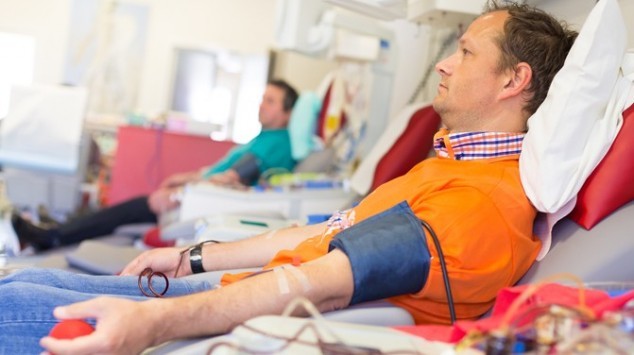
Opinion: Rodney Croome
2020 was the year Australia fell behind other countries on blood equality.
In April, the Trump administration announced a reduction in the celibacy period for gay men wanting to donate from twelve months to three.
President-elect, Joe Biden, then trumped that with a commitment to abolish the ban altogether.
Meanwhile, two gay-unfriendly regimes, in Hungary and Brasil, abolished their gay blood bans, bringing the list of countries without such bans to over twenty.
The year ended with the U.K. proposing to do the same by mid 2021.
Unsatisfactory compromise
Meanwhile, sluggish Australia still insists gay men, and bi men and trans women who have sex with men, have to be celibate for a year to donate.
Yes, there has been a proposal from Australia’s blood authorities to reduce the twelve-month celibacy period to three.
But this three-month proposal is an unsatisfactory compromise that reminds me of how civil unions were proposed to stave off the demand for marriage equality.
Moreover, there is no certainty when the three-month policy will be adopted.
It seems likely that, by the time the three-month celibacy policy is implemented in Australia, the US, UK and many other countries will have already have moved on from it.
In 2020, just.equal and PFLAG tried to lever the abolition of the GBT blood ban by targeting state and territory governments during their ratification of the change from twelve months to three.
But despite government leaders like Andrew Barr previously speaking out against the ban on gay blood donation, not one state or territory government pushed for blood equality, nor even for it to be considered.
Fear of a backlash
So, why is Australia so recalcitrant?
The problem isn’t science.
Clinical trials in a number of countries show that screening potential donors on the basis of risky sexual activity rather than gender of sexual partner actually decreases the likelihood of disease transmission through transfusion.
The real-world experience in countries like Spain and Italy, that lifted their gay blood bans in the early 2000s, shows exactly the same decrease in disease transmission.
The problem isn’t lack of LGBTIQ community concern.
Recent Australian research showed almost 75% of gay and bisexual men think the celibacy rule is homophobic and over 80% think it is unfair.
When PFLAG and just.equal launched a letter writing campaign to Australia’s health ministers earlier this year almost 5000 people wrote.
The problem isn’t even over-caution among Australia’s blood donor authorities.
In October, they eliminated the period people with new tattoos have to wait before donating, having undertaken just the kind of research and modelling they refuse to do on gay blood donation.
The problem is fear.
Some officials at the Red Cross Lifeblood service are afraid of a homophobic backlash from right wing politicians, religious groups and even some donors.
Some gay men and medicos who endured the AIDS crisis are understandably afraid of a return to the hysteria about gay men donating that swept the nation in the early 80s and lead to the current ban.
Rainbow-friendly politicians, as well as some of the politicos speaking for the LGBTIQ community, are more cynical: they’re afraid blood equality will require them to invest too much political capital for not enough return.
The problem is that too many people in authority are afraid to be the first to knock on the door of blood equality.
To overcome this fear, supporters of blood equality must do two things, make a compelling case, and make it often and loudly.
The case for blood equality is clear
Research by the widely respected Williams Institute at UCLA has shown that allowing gay blood donation would substantially increase the supply of safe blood in the United States, thereby saving lives.
Using the American analysis, Australia’s annual supply of safe blood would increase by at least 22,400 litres if we lifted the gay blood ban and adopted individual risk assessment in its place.
As well as saving lives, blood equality would reduce stigma.
The current ban says GBT people are a uniquely dangerous threat to public health.
It says we are too irresponsible and untruthful to be trusted to accurately report our sexual risk.
It cauterises us from the most fundamental biological and metaphorical link we have to other human beings, the red thread in our veins.
Everyday Australians understand the case for change.
Ask almost any heterosexual Australian whether, at a time of medical emergency in their life, they would accept blood from a gay man who was safe to donate and the answer would be “of course”.
Tell almost any cisgender office worker involved in a blood drive that their trans colleague can’t donate and they will be shocked and bewildered.
In a nation where LGBTIQ people can marry and found a family, serve their country through military service, and rise to some of the highest political offices, the blood donation ban no longer makes any sense.
The campaign for blood equality must be louder
In 2020, LGBTIQ Australians, including me, wrote letters to politicians and the Red Cross Lifeblood Service urging the GBT blood ban to be lifted.
Some of our community leaders welcomed the proposed reduction of the celibacy period hoping their cooperative spirit might encourage blood authorities to go further.
None of that worked.
In 2021 we must be more vocal, visible and uncompromising in pursuit of blood equality.
We need more LGBTIQ people to raise their voices and more allies to do the same.
We need blood donors, blood recipients and the medical community to join us.
In short, we must build a movement if we are to end Australia’s backwardness on blood donation and adopt a more equitable and rational donor policy.
If you are interested in moving blood equality forward contact me on rodney.croome@equal.org.au

Love OUTinPerth Campaign
Help support the publication of OUTinPerth by contributing to our
GoFundMe campaign.





